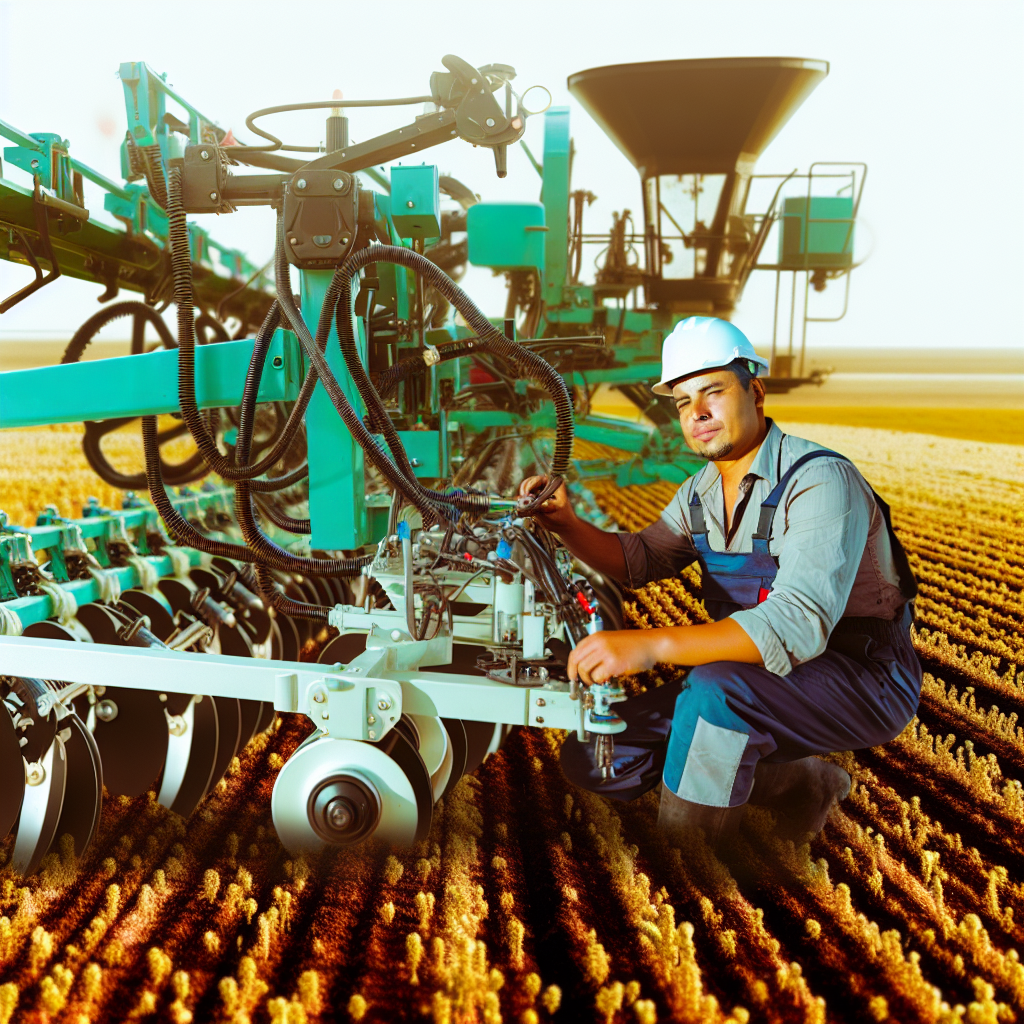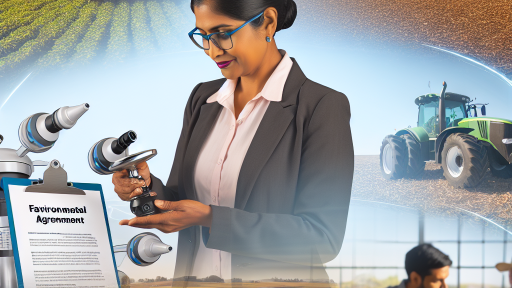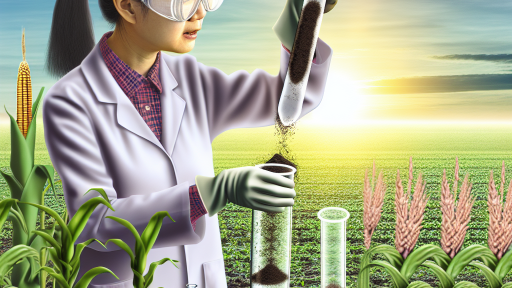Introduction to Automated Machinery in Sustainable Farming
Automated machinery plays a crucial role in modern sustainable farming.
This technology improves efficiency and reduces labor costs.
Furthermore, it minimizes environmental impact by optimizing resource use.
Farmers increasingly rely on automation to enhance productivity.
Subsequently, these advancements contribute to sustainable agricultural practices.
Understanding the Benefits of Automation
Automation offers numerous benefits for sustainable farming.
First, it boosts operational efficiency through precise processes.
Second, automated systems reduce waste by optimizing inputs.
For example, irrigation systems can adjust water usage based on crop needs.
Additionally, automation helps farmers monitor crop health more effectively.
Types of Automated Machinery
Various types of automated machinery support sustainable farming.
Tractors equipped with GPS technology enhance precision in planting.
Robotic harvesters can pick fruit without damaging crops.
Furthermore, drones assist in crop surveillance and mapping.
These tools enable farmers to make data-driven decisions.
Transform Your Agribusiness
Unlock your farm's potential with expert advice tailored to your needs. Get actionable steps that drive real results.
Get StartedIntegrating Technology for Better Practices
Integrating technology is essential for maximizing sustainability.
Farm management software provides farmers with real-time data.
This information guides crucial decisions about planting and harvesting schedules.
Moreover, data analytics enhances the efficiency of resource allocation.
By leveraging technology, farmers can further reduce their environmental footprint.
Benefits of Automation in Agriculture
Productivity and Efficiency
Automation significantly enhances productivity in agriculture.
Farmers can perform tasks more quickly and accurately.
This reduction in time spent increases overall efficiency.
Automated systems also minimize human error.
As a result, crop yields improve markedly.
Moreover, automated machinery operates around the clock.
This continuous operation ensures timely planting and harvesting.
Consequently, farmers maximize their output over planting seasons.
Cost Reduction
Automation leads to substantial cost savings in farming operations.
Labor costs decline as fewer workers are needed.
Additionally, precision agriculture minimizes resource waste.
Fertilizers and water usage become more efficient with automation.
This efficiency translates to reduced overall expenses.
Data-Driven Decision Making
Automated machinery integrates advanced data collection technologies.
Sensors monitor soil health, moisture levels, and crop conditions.
Farmers can analyze this data for better decision-making.
With accurate insights, they can predict and resolve issues promptly.
This proactive approach enhances productivity and sustainability.
Environmental Sustainability
Automation promotes environmentally sustainable practices in agriculture.
Showcase Your Farming Business
Publish your professional farming services profile on our blog for a one-time fee of $200 and reach a dedicated audience of farmers and agribusiness owners.
Publish Your ProfileFor instance, drones can assess crop health with minimal chemical use.
Therefore, smart spraying technologies reduce pesticide applications.
Moreover, automation enhances biodiversity through better land management.
Farming becomes more viable while protecting the environment.
Types of Automated Machinery
Overview of Key Technologies
Automated machinery plays a crucial role in sustainable farming practices.
It enhances efficiency while minimizing environmental impact.
Several key technologies define the landscape of agricultural automation.
Robotic Harvesters
Robotic harvesters increase productivity on farms.
These machines can work long hours without fatigue.
Additionally, they help reduce labor costs significantly.
Precision Harvesting
Precision harvesting focuses on collecting ripe crops only.
This minimizes waste and enhances crop quality.
Farmers can program robotic systems for various crop types.
Real-time Data Collection
Robotic harvesters often include sensors for data collection.
This technology allows farmers to monitor crop health constantly.
These insights drive better harvesting decisions.
Drones in Agriculture
Drones are revolutionizing crop monitoring and management.
They provide aerial views that improve decision-making.
Farmers use drones for tasks ranging from planting to inspections.
Crop Surveillance
Drones enable farmers to survey vast fields quickly.
This data reveals pest infestations or crop diseases early.
Consequently, farmers can take prompt action to mitigate damage.
Precision Spraying
Drones can apply pesticides and fertilizers with precision.
This reduces chemical usage and protects the environment.
It also lowers the risk of chemical runoff into water supplies.
Automated Irrigation Systems
Automated irrigation systems efficiently manage water resources.
They adapt to weather conditions and soil moisture levels.
Farmers can program these systems for optimal irrigation schedules.
Smart Controllers
Smart controllers help farmers tailor their irrigation practices.
They integrate data from sensors placed in the fields.
This technology ensures crops receive adequate water while conserving resources.
Drone-Assisted Irrigation
Drones can also assist in monitoring irrigation systems.
They identify areas that require adjustments to water delivery.
Using drones enhances overall irrigation efficiency.
Autonomous Tractors
Autonomous tractors improve efficiency and precision in the fields.
These machines can operate independently, reducing labor dependence.
They are equipped with GPS technology for accurate navigation.
Field Operations
Autonomous tractors can perform plowing, seeding, and tillage.
Farmers benefit from increased operational efficiency.
Consistent performance enhances crop yields significantly.
Showcase Your Farming Business
Publish your professional farming services profile on our blog for a one-time fee of $200 and reach a dedicated audience of farmers and agribusiness owners.
Publish Your ProfileData Integration
These tractors integrate data management systems seamlessly.
Farmers can monitor ongoing operations in real-time.
Data-driven insights lead to improved farming strategies.
Learn More: The Crucial Role Of Agri-Fintech In Supporting Sustainable Agricultural Growth
Robotic Harvesters: Reducing Labor Costs and Enhancing Yield
Overview of Robotic Harvesters
Robotic harvesters are revolutionizing the agricultural sector.
They use advanced technology to automate harvesting processes.
This innovation significantly reduces the need for manual labor.
Farmers benefit from more efficient operations as a result.
Cost-Effectiveness
One of the key advantages of robotic harvesters is cost reduction.
By decreasing labor costs, farmers can optimize their budgets.
Furthermore, robotic systems operate continuously, maximizing productivity.
As a result, farmers see increased profit margins over time.
Enhancing Crop Yields
Robotic harvesters also enhance overall crop yield.
They can operate in various weather conditions without stoppages.
This capability allows for timely harvesting, preserving crop quality.
In addition, these machines efficiently identify ripe crops.
This precision leads to less waste and better harvest quality.
Technological Advancements
Technological advancements drive the effectiveness of robotic harvesters.
Equipped with sensors, these machines analyze field conditions.
They can adapt to different crops and terrain types seamlessly.
As a result, farmers can expect higher reliability and performance.
Environmental Impact
Moreover, robotic harvesters contribute to sustainable farming practices.
They reduce soil compaction through optimized route planning.
This reduction helps maintain soil health for future crops.
Consequently, farmers can engage in more eco-friendly farming.
See Related Content: Future Trends In Farm Management Software Technology
Precision Agriculture: Drones and Sensors for Data-Driven Decisions
Overview of Precision Agriculture
Precision agriculture utilizes technology to enhance crop management.
Farmers apply precise amounts of water, fertilizers, and pesticides.
It improves efficiency and reduces environmental impact.
Role of Drones in Agriculture
Drones play a crucial role in modern farming practices.
They provide high-resolution aerial images of fields.
This data helps farmers identify crop health issues early.
Additionally, drones assist in monitoring irrigation systems.
Benefits of Using Sensors in Farming
Sensors collect real-time data about soil and weather conditions.
This information helps farmers make informed decisions.
They can optimize planting schedules based on soil moisture levels.
Furthermore, sensors can track nutrient levels in the soil.
Data Analysis for Improved Decision Making
Data analysis tools allow farmers to interpret collected information.
This enables effective crop management strategies to be implemented.
Farmers can adjust variables based on current data insights.
Showcase Your Farming Business
Publish your professional farming services profile on our blog for a one-time fee of $200 and reach a dedicated audience of farmers and agribusiness owners.
Publish Your ProfileConsequently, yield predictions become more accurate.
Case Studies in Precision Agriculture
Several farms successfully implement precision agriculture technologies.
For example, Meadow Farms uses drones to monitor crop health.
Their yield increased by 15% after adopting these technologies.
Similarly, Green Valley Farms integrated sensors for irrigation control.
This led to a significant reduction in water usage.
Future Trends in Precision Agriculture
Technological advancements will further enhance precision farming.
Integrating artificial intelligence can lead to smarter decision-making.
The use of machine learning algorithms will improve data analysis.
As a result, farmers will achieve more sustainable practices.
Uncover the Details: Using Remote Sensing to Detect Crop Diseases

Automated Irrigation Systems: Water Conservation Techniques
Introduction to Automated Irrigation
Automated irrigation systems revolutionize water management in agriculture.
They help farmers irrigate crops efficiently and effectively.
These systems reduce overall water usage while improving crop yields.
Types of Automated Irrigation Systems
Several types of automated irrigation systems exist today.
Drip irrigation delivers water directly to plant roots.
Sprinkler systems distribute water over a larger area.
Subsurface irrigation provides moisture below the soil surface.
Benefits of Automated Irrigation
- Enhances water conservation efforts significantly.
- Minimizes water waste through precise application.
- Improves crop health and productivity.
Moreover, these systems allow for better planning and management.
Farmers can monitor soil moisture levels through sensors.
Specific Water Conservation Techniques
Implementing soil moisture sensors is crucial.
These sensors alert farmers when to water their crops.
Additionally, rainwater harvesting systems complement irrigation setups.
They collect and store rainwater for later use.
Technology Integration
Modern automated irrigation systems use advanced technology.
Weather-based controllers adjust irrigation schedules automatically.
This feature ensures irrigation aligns with environmental conditions.
Global Examples of Successful Practices
Farmers across the globe adopt these practices with success.
In California, Dr. Sarah Mitchell utilizes drip irrigation on her farm.
She reports a 30% reduction in water usage since implementation.
Additionally, farmers in Brazil benefit from sprinkler systems.
Implications for Future Agriculture
Automated irrigation stands at the forefront of sustainable farming.
As technology advances, these systems will become even more efficient.
Farmers must embrace these innovations to secure their future.
Gain More Insights: Automated Machinery Safety Practices For Farmers
Soil Management Tools: Enhancing Soil Health with Automation
Importance of Soil Health
Soil health is vital for sustainable farming practices.
Healthy soil promotes plant growth and increases food production.
In addition, it supports a diverse ecosystem and improves water retention.
Automated Soil Analysis Systems
Automated soil analysis systems significantly enhance data accuracy.
These systems provide real-time insights into soil nutrients and pH levels.
Showcase Your Farming Business
Publish your professional farming services profile on our blog for a one-time fee of $200 and reach a dedicated audience of farmers and agribusiness owners.
Publish Your ProfileFarmers can make informed decisions based on precise measurements.
Consequently, this automation helps optimize fertilizer use and reduce waste.
Precision Agriculture Technologies
Precision agriculture leverages technology for targeted soil management.
GPS-guided equipment minimizes input use while maximizing output.
This technology allows farmers to apply fertilizers only where needed.
As a result, it enhances soil fertility sustainably and efficiently.
Soil Moisture Sensors
Soil moisture sensors monitor water levels in real-time.
This technology prevents over-irrigation and reduces water consumption.
Moreover, sensors help maintain optimal moisture levels for crops.
They enable farmers to conserve resources while ensuring crop health.
Cover Crop Management
Automated cover crop systems simplify the management of cover crops.
These systems enable precise planting and termination of cover crops.
Consequently, they improve soil structure and nutrient cycling.
Furthermore, cover crops enhance biodiversity and reduce erosion.
Integration of Drones in Soil Management
Drones provide a unique perspective for soil management strategies.
They capture high-resolution images to assess crop health and soil conditions.
Additionally, drones can identify problems early, enabling prompt action.
This proactive approach helps maintain soil health effectively.
Benefits of Automation in Soil Management
Automation saves time and reduces labor costs on farms.
It also promotes consistent and accurate soil management practices.
Overall, these tools contribute to more sustainable agricultural practices.
Ultimately, they foster resilience in farming systems globally.
Future Trends in Automated Farming Machinery: Innovations on the Horizon
Advancements in Precision Agriculture
Precision agriculture is transforming how farmers manage their resources.
New technologies enable farmers to use data-driven insights.
These insights allow for targeted inputs, reducing waste significantly.
Moreover, drones are increasingly used for crop monitoring and analysis.
As a result, farmers can make informed decisions quickly.
Integration of Artificial Intelligence
Artificial intelligence continues to influence agricultural machinery.
AI systems analyze vast amounts of data to optimize farming practices.
This leads to improved yield predictions and efficient resource allocation.
Furthermore, AI-powered robots can automate labor-intensive tasks.
Such tasks include planting, weeding, and harvesting crops effectively.
Emphasis on Sustainable Practices
Automated machinery is increasingly focused on sustainability.
Machines now incorporate eco-friendly designs and materials.
This shift helps reduce the carbon footprint of agricultural activities.
Additionally, innovations aim to conserve water and enhance soil health.
Farmers can now rely on automatic irrigation systems for efficiency.
Enhanced Connectivity and IoT
The Internet of Things (IoT) is reshaping agricultural machinery.
Smart sensors monitor crops and soil conditions in real-time.
This connectivity enables farmers to respond to changing conditions swiftly.
Showcase Your Farming Business
Publish your professional farming services profile on our blog for a one-time fee of $200 and reach a dedicated audience of farmers and agribusiness owners.
Publish Your ProfileFurthermore, IoT systems can facilitate predictive maintenance of equipment.
As a result, downtime due to equipment failure is minimized.
Investments in Robotics and Automation
Investment in robotics is rapidly increasing within the agricultural sector.
Robots are being designed for various roles on the farm.
From planting to sorting and packing, automation boosts efficiency.
Additionally, autonomous tractors are gaining popularity among farmers.
These machines perform tasks with minimal human intervention.
Additional Resources
Welcome to Precision Agriculture Center ! | Precision Agriculture …




